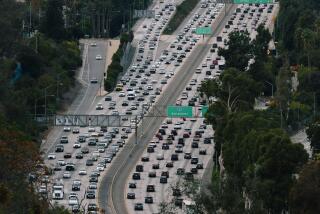Job Makes Sweeping Demands on Employee
- Share via
There was H. E. (Butch) Boutcher, driving down the freeway at 4 m.p.h. Wednesday, as he does every day, getting the same obscene gestures.
“Those people want me to do my job at night or weekends,” said Boutcher, 59, who has been driving street sweepers on both sides and the middle of 180 miles of Orange County freeways for the past 13 years. “When we worked weekends, they yelled at us to sweep during the week.”
As he drove the $80,000 California Department of Transportation (Caltrans) sweeper Wednesday, cleaning lanes on an interchange leading to the Santa Ana Freeway, Boutcher said drivers sometimes are outrageous.
“You know we used to put cones out and close a lane, and we’d have people open their car door just to knock them over,” he said. “People think that it’s their freeway and that no one should slow them down.”
But rolling lane closures are now used during the sweep “so while we may back the traffic up a bit, we don’t actually close anything down, but drivers still sass us,” said Boutcher, a Texan who still talks with a twang. “It’s also safer because we don’t have to pick up the cones.”
Because 29 Caltrans workers have been killed in the past 12 years on freeways, Boutcher is protected by a rolling contingent of heavy equipment during the days he cleans the narrower, and more dangerous, interchange ramps.
On the freeway itself, a smaller contingent usually accompanies him.
The entourage includes a lead truck with flashing signs, a couple of backup trucks with rear crash cushions and a trailing truck with flashing signals warning drivers to slow.
“I don’t think I can be hurt because I’m protected by the sweeper,” said Boutcher, the senior sweeper driver in Caltrans Region 1, which includes the Santa Ana, Costa Mesa, Orange and Garden Grove freeways. “But that doesn’t protect my heart.”
Boutcher’s boss, Region 1 Supt. George Hays, said the work isn’t for aesthetics.
“If we don’t get the debris and dirt picked up and the rains start, it’s going to clog the drain lines and then you really have trouble,” he said. “The freeways would soon flood.”
Also, he said, motorists, tow truck drivers and California Highway Patrol officers need to be able to pull over without driving over such things as nails “and causing them even more problems like getting a flat.”
During his daily 18-mile cleaning run, which starts at 6:30 a.m., Boutcher picks up about 12,000 pounds of dirt, glass, wood, nails and metal and “more when the wind acts up or a truck spills a load of dirt.”
“You know,” he said, “keeping the freeway clean is very important, and I don’t think too many people think of it except when they become involved in it.”
For example, he said, if something spills all lanes might be closed, and Boutcher is summoned from his regular route to clean up.
“People are really mad when they get caught up in one of them, but I can usually get there pretty quick,” he said, noting that his sweeper can reach speeds up to 55 m.p.h. “But you know when they pass me by after the cleanup, a lot of them shake their fists at me.”
Boutcher says he does a lot of thinking about that, but “it’s still a good job. I know I’m doing something to help a lot of people.”
More to Read
Sign up for Essential California
The most important California stories and recommendations in your inbox every morning.
You may occasionally receive promotional content from the Los Angeles Times.










